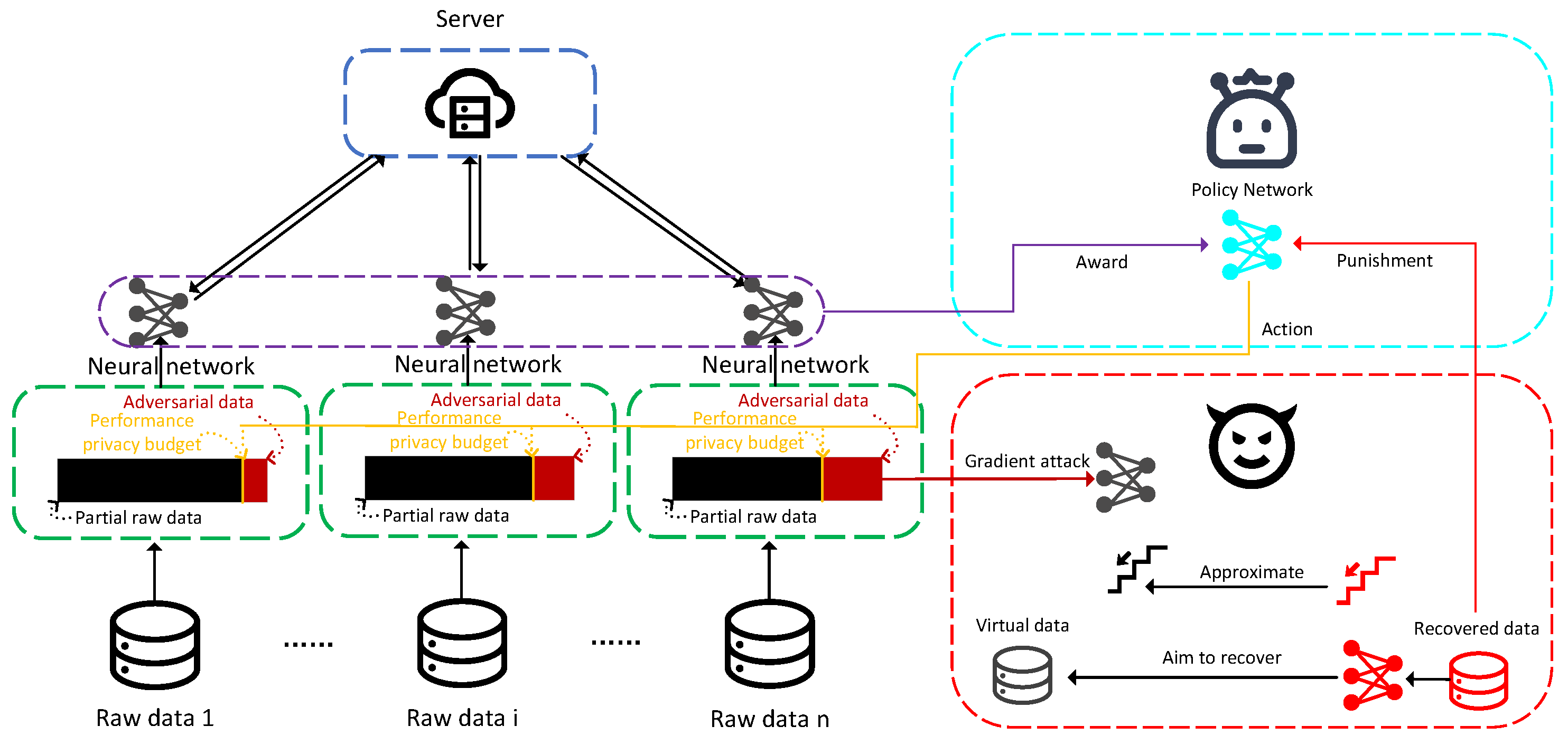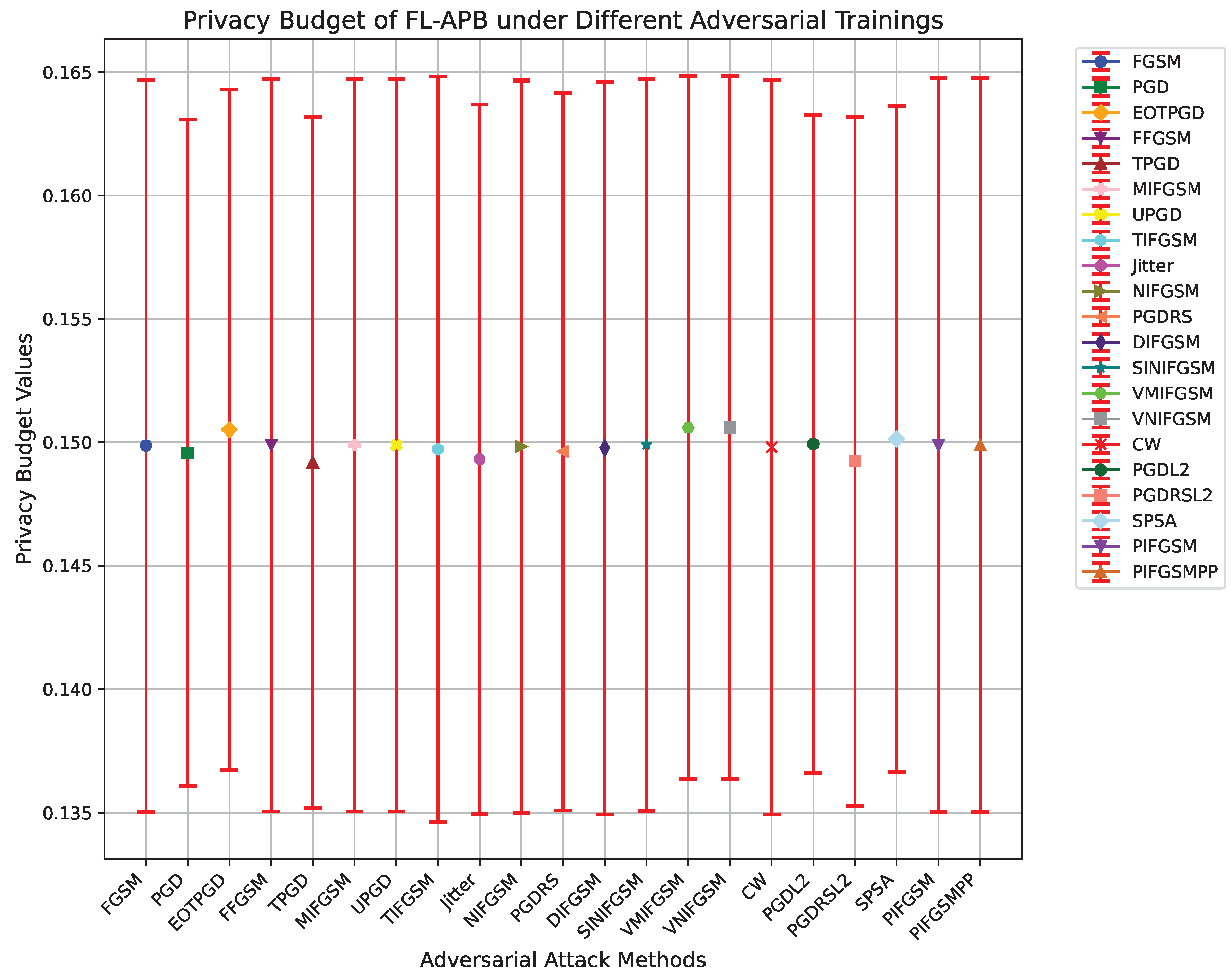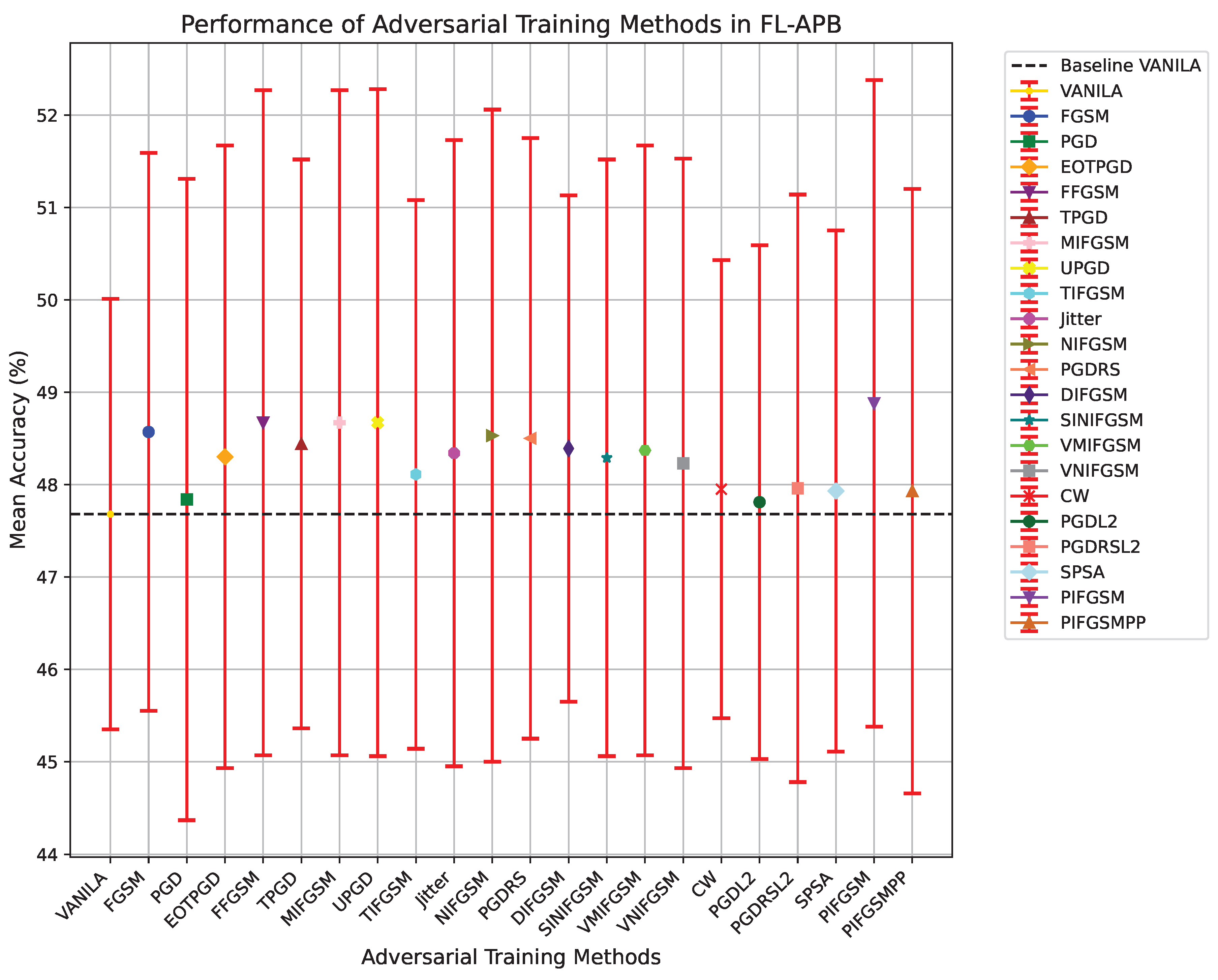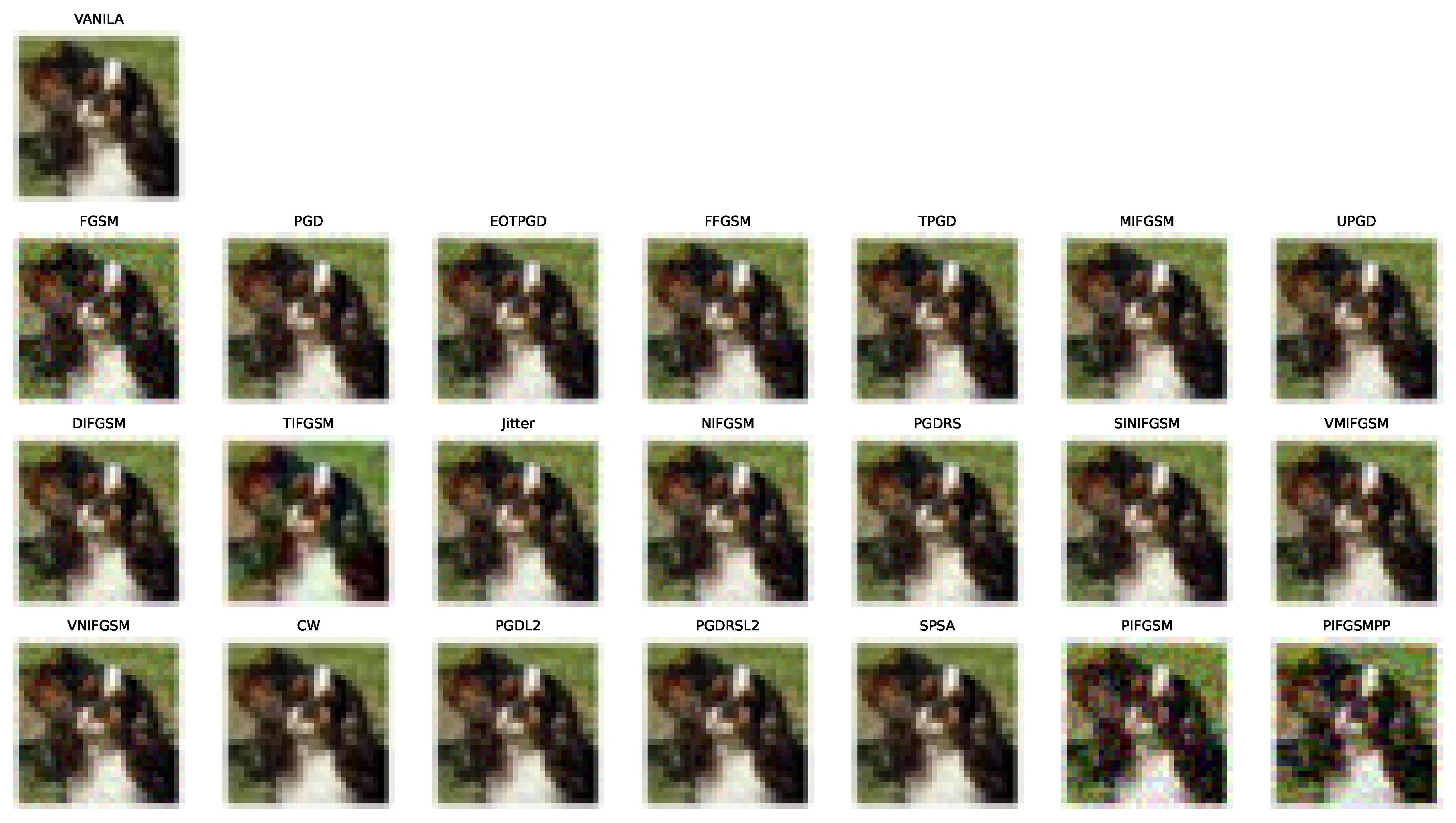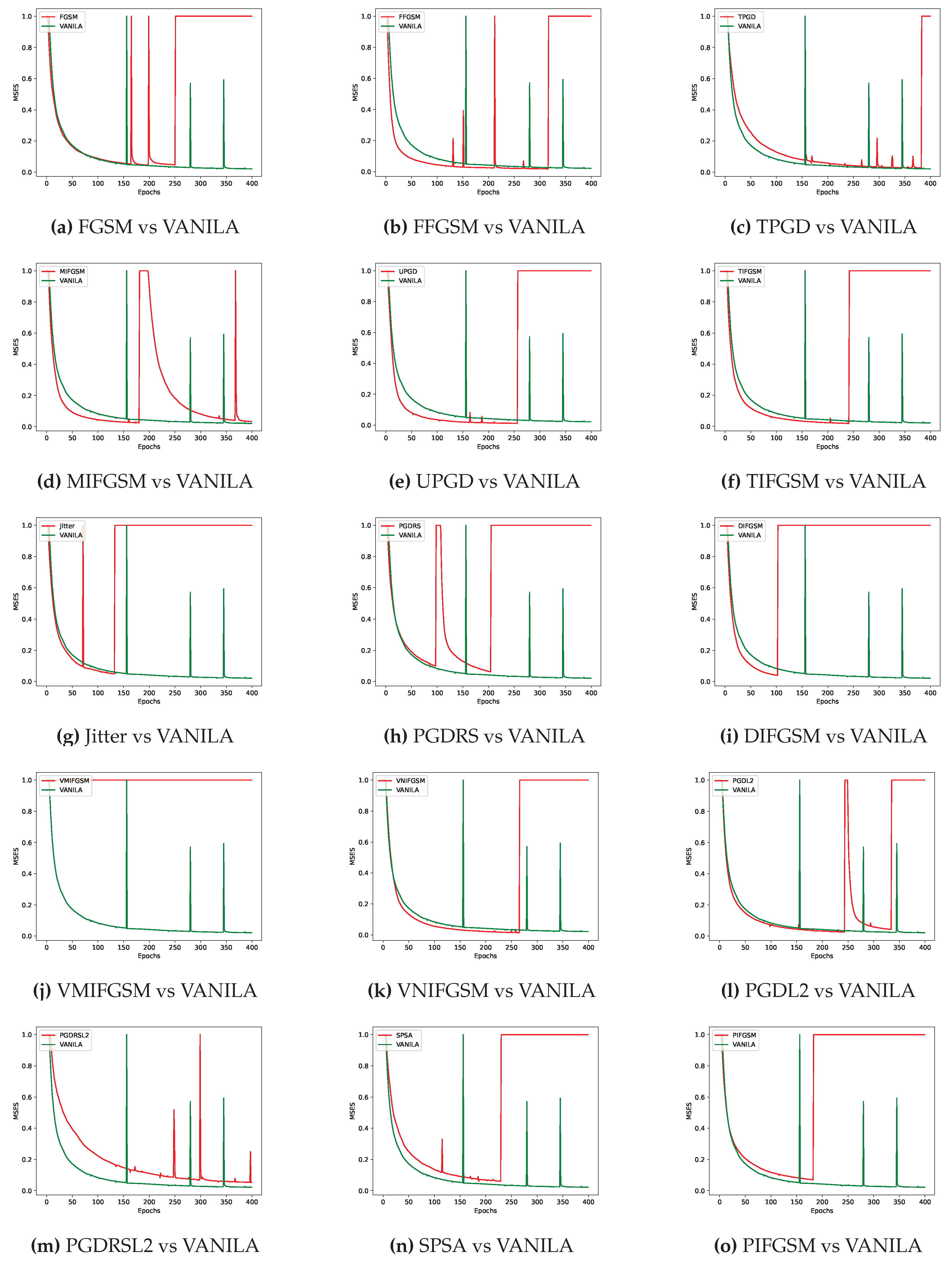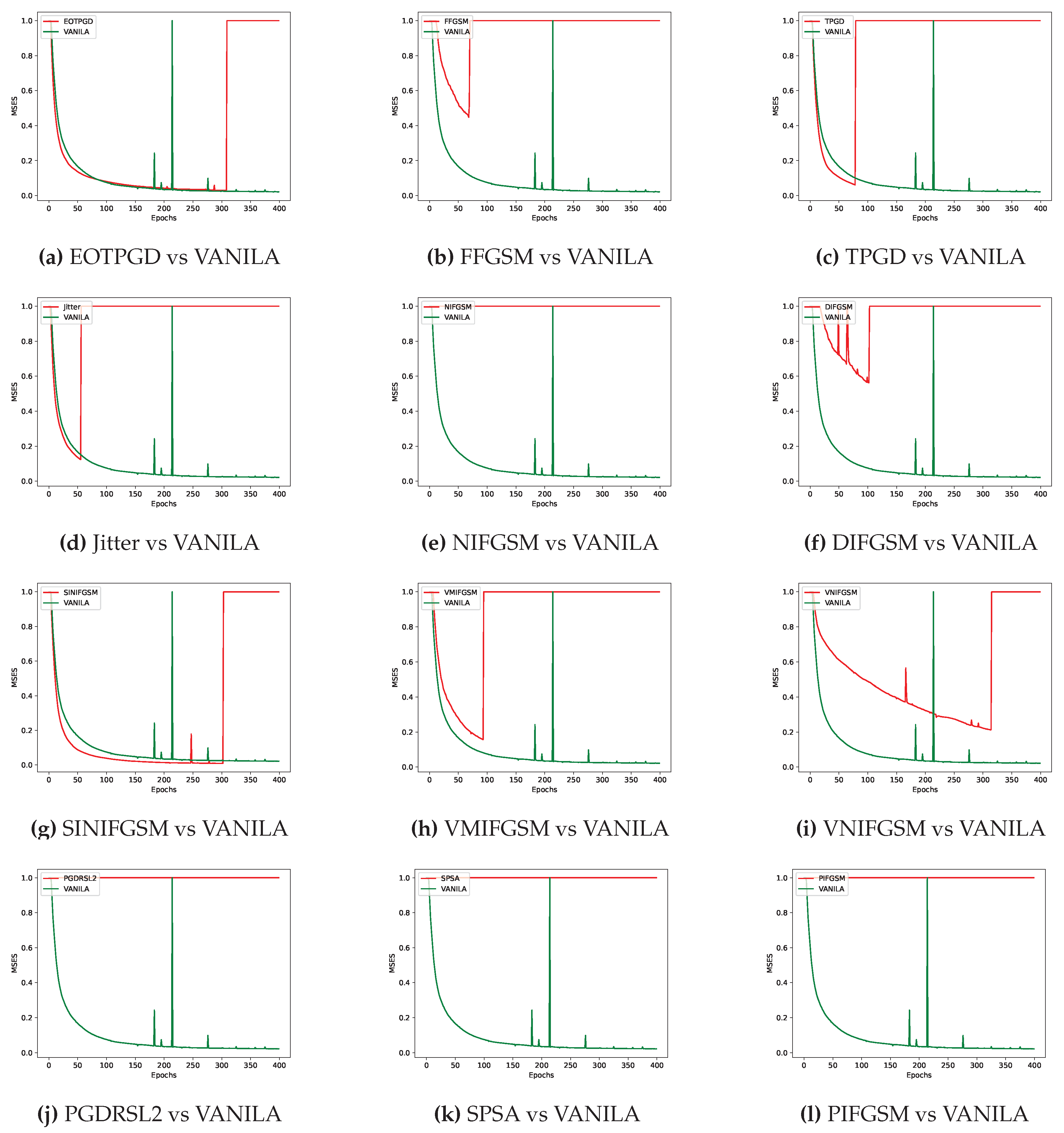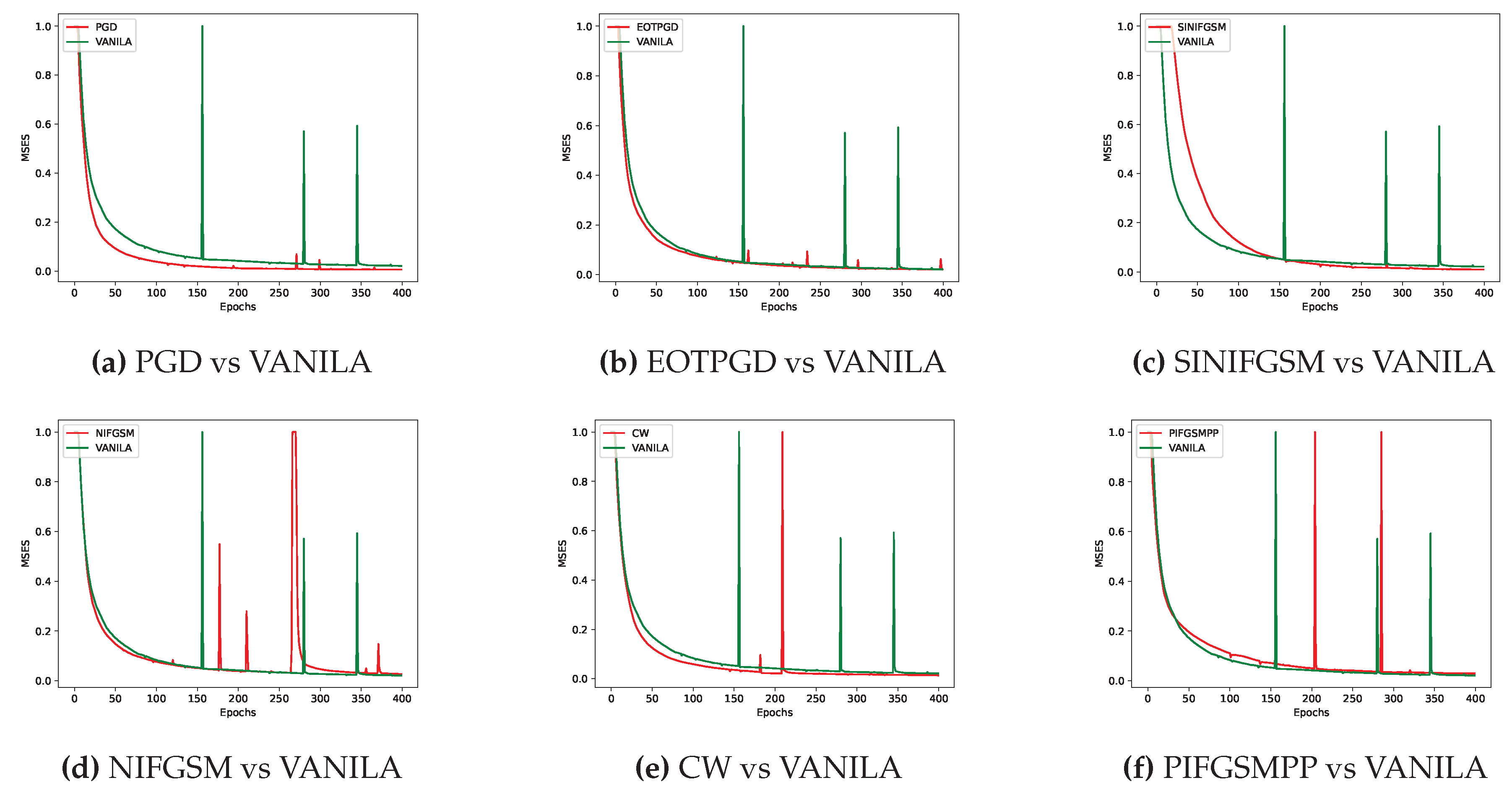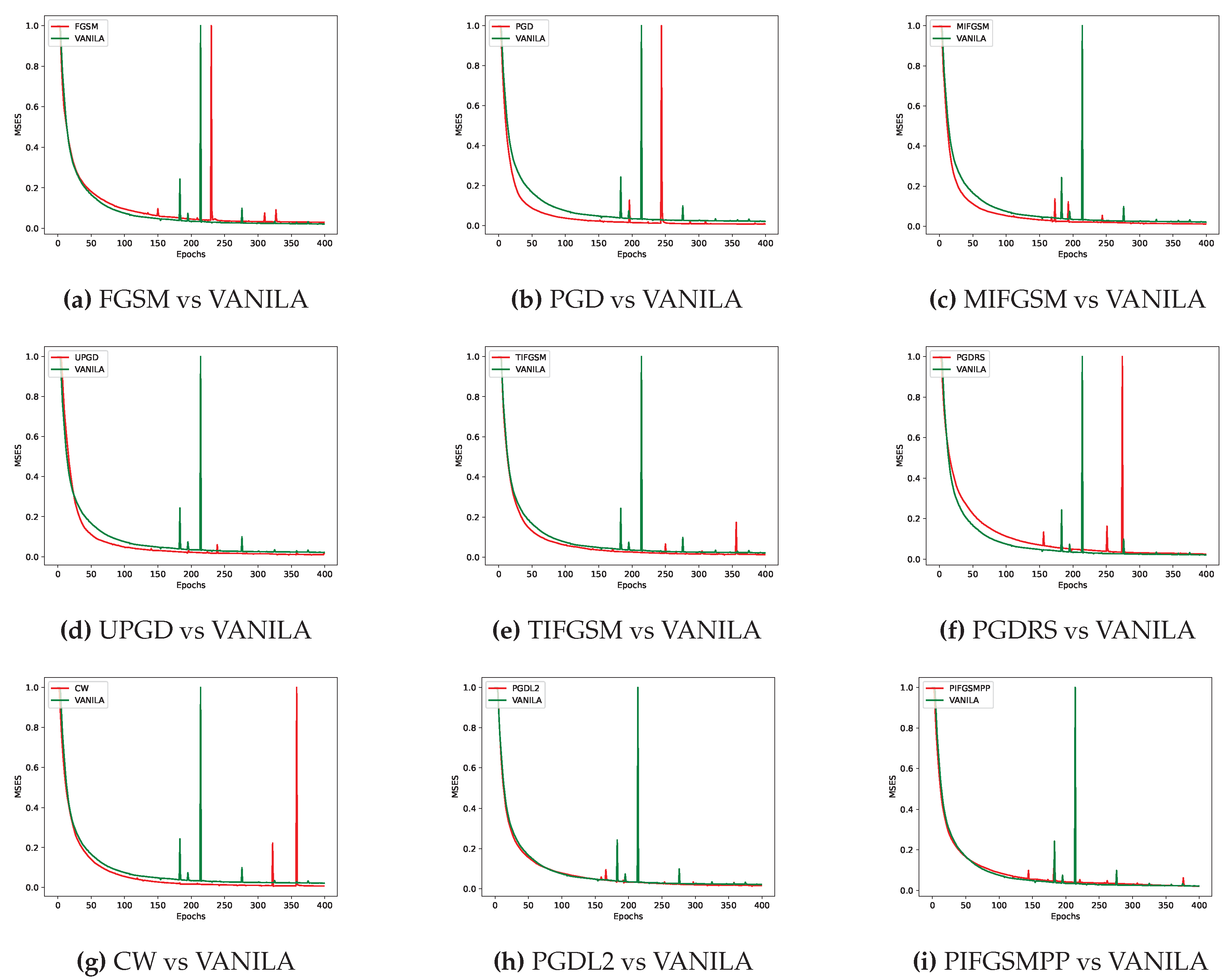1. Introduction
Federated Learning (FL) [
1,
2] is an emerging distributed machine learning approach designed for effective model training in scenarios with high data privacy and security requirements. Unlike traditional centralized learning, FL allows multiple participants to collaboratively train a global model without sharing raw data. Each participant conducts local model training and sends the updated model parameters to a central server for aggregation, while the raw data remains on local devices. This model protects participant privacy while effectively utilizing decentralized data resources, making it widely applicable in fields such as finance, healthcare, and intelligent transportation [
3,
4,
5,
6].
The key advantage of FL is its ability to avoid the privacy leakage risks associated with data centralization, aligning with increasingly stringent data privacy regulations (such as GDPR [
7]). Furthermore, FL leverages distributed computing resources to enhance training efficiency and reduce the costs and risks of data transmission. Therefore, FL not only aids in building efficient machine learning systems but also provides a viable solution for applying machine learning in scenarios where data privacy and security are critical [
8].
Despite its significant privacy protection advantages, FL faces numerous challenges [
9,
10,
11]. First, privacy concerns remain a core issue for FL. Although participants do not need to share raw data, the transmission of model update parameters may reveal sensitive information about the original data, allowing attackers to infer participants’ private data by analyzing patterns in the model updates [
12]. Additionally, balancing privacy protection and model performance poses a significant challenge. Excessive privacy protection mechanisms (such as differential privacy) can prevent data leakage but may lead to declines in model performance, affecting accuracy and usability [
13].
Second, model performance also encounters various technical challenges. In FL, participants’ data is often heterogeneous (uneven data distribution and significant feature differences), which can hinder model convergence, especially with a large number of participants [
14]. Moreover, communication overhead and computational resource constraints can affect training efficiency, making it an important direction of FL research to improve model performance and convergence speed while ensuring privacy [
15].
To address the privacy and robustness issues in FL [
16], adversarial training (AT) has gradually been introduced into the FL domain [
17]. Adversarial training introduces adversarial attack samples during model training, enabling the model to maintain stability and robustness when faced with malicious attacks [
18]. This method not only enhances the model’s defense against privacy data leakage attacks but also improves overall model security [
19]. However, the application of adversarial training in FL also comes with certain drawbacks.
First, while adversarial training can effectively enhance model robustness, it can slow down convergence speed and increase computational complexity during training. Additionally, the introduction of adversarial samples may result in decreased model performance (such as accuracy). Particularly in FL environments, data heterogeneity and distribution differences exacerbate these issues, making it a pressing challenge to maintain model performance while protecting privacy [
20,
21,
22,
23,
24].
To balance privacy protection and model performance during FL training, this paper proposes a new algorithm—FL-APB (Federated Learning with Adversarial Privacy-Performance Balancing). Existing methods often focus on improving one aspect of performance, either emphasizing privacy protection at the cost of model accuracy and convergence speed, or prioritizing model performance while neglecting the risks of privacy leakage. Therefore, designing an algorithm that simultaneously considers privacy protection and performance optimization has become the main motivation for this research.
The core idea of FL-APB is to combine adversarial training with privacy protection mechanisms, dynamically adjusting the privacy budget and performance budget during training to achieve a balance between the two. This algorithm maximizes model performance while ensuring privacy protection and mitigates the negative impact of adversarial training through adaptive adjustments.
The goal of this paper is to achieve a balance between privacy protection and performance optimization in Federated Learning. To this end, we propose the FL-APB algorithm and validate its effectiveness across different adversarial training methods through theoretical analysis and experimental verification. The main contributions of this paper are as follows:
1. Proposing the FL-APB algorithm, which achieves a balance between privacy protection and performance optimization by dynamically adjusting the privacy budget and performance budget.
2. Introducing adversarial training, which enhances the robustness of FL models while improving overall performance in conjunction with privacy protection.
3. Conducting experimental validation and theoretical analysis to verify the convergence, robustness, privacy protection capabilities, and performance optimization effects of the FL-APB algorithm through multiple sets of experiments, showcasing its application potential in real-world scenarios.
4. Providing a new solution for privacy protection and performance optimization, serving as a reference for further research on balancing privacy protection and performance optimization in FL.
The content of this paper is arranged as follows:
Section 2 briefly reviews related work on privacy protection and performance optimization in Federated Learning.
Section 3 introduces the FL-APB system model, analyzes issues related to privacy protection and performance optimization, and conducts convergence analysis and privacy-performance trade-off analysis of the FL-APB algorithm.
Section 4 provides a brief introduction to the experimental setup.
Section 5 analyzes and discusses the experimental results.
Section 6 concludes the paper and outlines future research directions.
2. Related Work
In this section, we will systematically review the existing literature on differential privacy within the context of federated learning, elucidating their applications and inherent limitations, particularly with respect to their impact on model performance. Additionally, we will explore the integration of adversarial training in federated learning, emphasizing its potential to enhance model robustness while critically examining its detrimental effects on convergence speed and overall performance. Furthermore, we will analyze current research focused on optimizing performance in federated learning, addressing challenges related to data heterogeneity, accelerating model convergence, and minimizing communication overhead. This analysis will include a discussion of the trade-offs between these optimization techniques concerning privacy protection and performance. Ultimately, we will provide insights into how recent advancements seek to balance privacy protection with performance optimization, setting the stage for the introduction of our proposed FL-APB algorithm.
2.1. Differential Privacy in FL
In federated learning (FL), data privacy remains a core challenge. To address this, differential privacy (DP) is widely implemented within the FL framework. DP safeguards participants’ private data from attackers by introducing noise into the data or model updates. Article [
25] proposes a user-level differential privacy method (UDP) and derives the theoretical convergence upper bound for the UDP algorithm. Additionally, it introduces a communication round discount (CRD) method that balances computational complexity and convergence performance effectively. Article [
26] presents a DP-based FL framework designed for generating personalized models for heterogeneous clients, analyzing its convergence performance and the optimal trade-offs among various metrics. Article [
27] introduces a federated learning method called Dynamic Fisher Personalization and Adaptive Constraint (FedDPA) to address non-IID data distribution and mitigate privacy leakage risks in personalized federated learning. FedDPA leverages layer-wise Fisher information to assess the informational content of local parameters, allowing it to retain local parameters with high Fisher values during the personalization process and avoid noise interference. It also employs adaptive constraint strategies to enhance the convergence of both personalized and shared parameters. Article [
27] proposes a local differential privacy scheme (ACS-FL) aimed at training clustered federated learning models on heterogeneous IoT data through adaptive clipping, weight compression, and parameter shuffling. ACS-FL achieves a favorable balance between privacy and utility by alleviating the curse of dimensionality, reducing LDP noise, and minimizing communication overhead. Article [
29] presents a perturbation algorithm (PDPM) designed to meet personalized local differential privacy (PLDP) requirements. The PDPM algorithm allows clients to adjust privacy parameters based on data sensitivity, providing personalized privacy protection. While these methods effectively enhance privacy and achieve a favorable balance between privacy and utility, they often negatively impact model performance, as excessive noise injection can lead to decreased accuracy.
2.2. Adversarial Training in FL
To further enhance models’ defenses against privacy leaks and malicious attacks, adversarial training has been gradually integrated into FL. In adversarial training, participants generate adversarial samples for model training, enabling models to remain robust against malicious attacks. The paper [
30] explores fairness issues in FL, promoting individual fairness through distributed adversarial training without compromising data privacy. The paper [
31] proposes a federated adversarial learning paradigm (FAL) tailored for FL, aimed at utilizing decentralized training data. This approach addresses unique vulnerabilities exposed by multi-step local updates prior to aggregation and conducts convergence analysis using appropriate gradient approximation and coupling techniques. The paper [
23] introduces a margin-based federated adversarial training method (GEAR), which encourages minority classes to maintain larger margins by introducing a margin-based cross-entropy loss, while regularizing the decision boundary to be smoother, thereby providing an improved decision boundary for the global model. However, while adversarial training enhances model robustness, it inevitably increases training complexity and slows convergence, particularly in heterogeneous FL environments. Furthermore, the introduction of adversarial samples can result in diminished model performance (e.g., accuracy), posing a significant challenge in balancing privacy protection and performance optimization through adversarial training.
2.3. Balancing Privacy and Performance in FL
Despite significant advances in both privacy protection and performance optimization, achieving an effective balance between the two remains a pressing issue. Reference [
16] employs a natural adversarial optimization method that trains an encoding function alongside a deep neural network for private attribute classification. This approach proposes a stable and convergent optimization method that successfully learns an encoder meeting privacy requirements while maintaining utility. Article [
18] investigates the robustness of machine learning (ML) through adversarial training in both centralized and decentralized environments, exploring the design of ML algorithms to enhance training accuracy across various adversarial training methods. Reference [
19] introduces a novel adversarial training framework that explicitly learns a degradation transformation for original video inputs to optimize the trade-off between target task performance and the privacy budget of degraded videos. This framework utilizes different definitions of privacy budgets to maintain high performance in target tasks (such as action recognition) while effectively mitigating privacy breach risks. Article [
20] conducts a comprehensive robustness evaluation of existing federated learning (FL) methods to better understand their adversarial vulnerabilities, proposing a new algorithm called Decision Boundary-based Federated Adversarial Training (DBFAT), which incorporates local re-weighting and global regularization components to improve the accuracy and robustness of FL systems. Reference [
22] presents a new algorithm, FedDynAT, designed for adversarial training (AT) in federated environments, significantly enhancing both natural and adversarial accuracy while reducing model drift and accelerating convergence. Article [
24] examines the FAT problem under label skewness and identifies root causes of training instability and degradation in natural accuracy. To address these issues, a Calibrated FAT (CalFAT) method is proposed, which adaptively calibrates logits to balance classes, thus resolving stability challenges. Existing privacy protection methods often prioritize enhancing privacy defenses while neglecting their impact on model performance; conversely, some performance optimization algorithms focus on accelerating convergence and improving accuracy but do not adequately address privacy protection. Therefore, designing a federated learning algorithm that concurrently considers both privacy protection and performance optimization has become the primary motivation for this study. To this end, we propose the FL-APB algorithm, which integrates adversarial training with privacy protection mechanisms to dynamically adjust privacy and performance budgets, thereby achieving a balance between privacy protection and performance optimization.
3. System Model
In this section, we introduce the main components and working mechanism of the FL-APB system model. As shown in
Figure 1, when FL training is subjected to privacy attacks, the FL-APB algorithm balances privacy and performance budgets by generating adversarial training strategies to prevent attackers from stealing sensitive information.
3.1. Problem Definition
In FL, each participant
i has a local dataset
and a local loss function
, where
w represents the global model parameters. The global objective is to minimize the average loss across all participants:
To protect user privacy, participant
i introduces differential privacy to its local dataset
, aiming to ensure that model updates adhere to
-differential privacy
-DP):
where
M is the model update mechanism,
and
are neighboring datasets,
S is the output space of the model update, and
controls the degree of privacy leakage.
Specifically, we achieve enhanced model robustness and privacy protection through adversarial training with
. The adversarial training loss is defined as:
where
is the adversarial perturbation,
is the perturbation limit, and
denotes the model loss function.
To simultaneously optimize privacy protection and model performance, we define a total loss function
, which combines performance loss and privacy protection loss. Privacy and performance budgets control the weights of these components:
where
represents the model’s performance loss, including either regular training loss or adversarial training loss.
represents the privacy protection-related loss, such as the impact of noise added to meet differential privacy requirements.
and
are dynamic weights, satisfying
, used to adjust the balance between privacy protection and performance optimization.
3.1.1. Design of FL-APB
The goal of FL-APB is to minimize the total loss function
, which integrates model performance loss and privacy protection loss. The objective function is expressed as:
To dynamically adjust and , we introduce the Proximal Policy Optimization (PPO) algorithm. PPO is a reinforcement learning algorithm that updates weight parameters through policy gradient methods, ensuring stability and convergence of each update.
FL-APB uses the policy to generate weights and , where s is the current state (such as privacy leakage level and model performance), and is the policy parameter. The policy objective is to maximize the reward , which is the reward obtained from actions taken in the given state.
The loss function for FL-APB is defined as:
where
is the ratio of the current policy to the old policy:
is the advantage function used to evaluate the superiority of the current action relative to other possible actions.
is a parameter controlling the update range, ensuring that the policy update does not exceed the
limit.
In each training iteration, new values of
and
are generated to balance privacy loss and performance loss. The weight update formula is:
where
is the reward for each training round, typically related to the balance between privacy protection and model performance.
The final optimization objective is to minimize the loss function
, while generating and optimizing weights
and
:
Finally, the policy parameters
are updated to generate better
and
:
where
is the learning rate, and
is the policy gradient used to optimize the policy parameters.
3.2. Theoretical Analysis
In this section, we will perform a theoretical analysis of the FL-APB algorithm, focusing on its convergence and the trade-offs between privacy and performance.
3.2.1. Convergence Analysis
Firstly, FL-APB balances privacy leakage and model performance by dynamically adjusting the weights and for privacy protection and performance optimization. The PPO (Proximal Policy Optimization) reinforcement learning algorithm used in FL-APB has good convergence properties. In each iteration, PPO avoids drastic policy fluctuations by restricting the magnitude of policy updates, ensuring the stability of the training process.
In FL-APB, the core idea of using PPO is to optimize the dynamic weights
and
through policy gradients, thereby minimizing the total loss function
in equation
4. The FL-APB algorithm aims to simultaneously optimize privacy protection and model performance. We have two loss functions:
, which evaluates the model’s standard training error, representing the model’s performance; and
, which measures the impact of privacy protection, typically including noise introduced by differential privacy. In each local training, the model’s performance loss
and privacy loss
are independent and can be balanced through dynamic adjustment of weights.
According to the Lagrange multiplier method, we can represent the problem as a constrained optimization problem as shown in equation
9. To solve this constrained optimization problem, we introduce the Lagrange multiplier
and define the Lagrangian function
:
Next, we take the derivatives of
and find the optimal solution by setting the derivatives to zero.
First, we differentiate with respect to
and
:
We also handle the constraint
:
Setting these partial derivatives to zero:
This equality indicates that, in the optimal case, performance loss and privacy loss should be equal. At this point, FL-APB will automatically adjust the weights so that the performance loss and privacy loss of the model are balanced.
FL-APB dynamically adjusts weights
and
through the PPO algorithm, moving towards the optimal balance point between privacy and performance in each iteration. The objective of PPO is to maximize the reward
, which we assume is directly related to the balance between privacy protection and performance. It is defined as:
In each iteration, the weight update formula is:
Combined with the PPO policy gradient optimization method, the policy gradient update method is given by equation
10. According to the theory of policy gradient optimization, with appropriate choice of learning rate, the gradient descent process is convergent and will eventually reach the optimal policy.
According to policy gradient theory, the PPO algorithm will gradually converge to the optimal policy after multiple iterations. For FL-APB, this means that the weights and will tend towards a point that optimally balances performance loss and privacy protection loss.
Furthermore, the convergence of FL-APB depends on the PPO update mechanism, which restricts the step size of policy updates through the operation in equation
7, ensuring that new policies always stay within the neighborhood of old policies and do not deviate significantly. This mechanism controls the update magnitude of the policy by the parameter
. Small policy updates ensure that the algorithm gradually converges under various training conditions, leading to stable weight adjustment strategies.
3.2.2. Privacy and Performance Trade-Off Analysis
The core objective of the FL-APB algorithm is to make a reasonable trade-off between model performance and privacy protection. In differential privacy mechanisms, as shown in equation
2, the privacy leakage level is controlled by the privacy parameter
. A smaller
value implies stronger privacy protection but may negatively impact model performance, such as increased noise during training, leading to slower convergence or decreased performance, i.e.:
This means that when privacy protection (i.e., smaller
) increases, the performance loss
becomes larger, and vice versa. Therefore, FL-APB balances the performance loss due to differential privacy and the actual application needs of the model by introducing dynamic weights
and
.
Specifically, when the risk of privacy leakage is high, the policy generates a larger value to enhance privacy protection and limit the possibility of attackers stealing private data. Conversely, when the model’s performance is poor, the policy generates a larger value to prioritize performance optimization. Through this dynamic weight adjustment mechanism, FL-APB can make targeted optimization decisions at different training stages to achieve a balance between privacy and performance.
According to the PPO policy optimization algorithm, the long-term expected reward of FL-APB directly reflects the balance between privacy protection and performance optimization. In each training iteration, the policy generates the optimal weight combination and based on the current state (such as privacy leakage level and model performance) to minimize the loss function and maximize the reward. As training progresses, the policy will converge, allowing the FL system to meet privacy protection requirements while ensuring the model’s performance.
4. Experimental Setup
This section introduces the experimental setup used to evaluate the proposed FL-APB algorithm, including the dataset, baseline methods, evaluation metrics, and implementation details.
4.1. Dataset Description
To comprehensively evaluate the performance of the FL-APB algorithm, the CIFAR-10 dataset was selected for the experiment. This dataset contains 60,000 32x32 pixel color images categorized into 10 classes. To simulate the Non-IID scenario in federated learning, the dataset was partitioned using a Dirichlet distribution, creating uneven data distribution across clients. Each class’s data was allocated to multiple clients in varying proportions to ensure data imbalance among clients. Meanwhile, the amount of data per client was kept above a predefined threshold to avoid extreme imbalance situations.
4.2. Baseline Methods
To verify the effectiveness of the FL-APB algorithm, we compared it with the standard federated learning algorithm FedAvg, which lacks privacy protection mechanisms. Specifically, we compared the test accuracy of the model after 100 rounds of training under FL-APB optimization, while analyzing the impact of different adversarial training methods (FGSM[
32], PGD[
33], EOTPGD[
34], FFGSM[
35], TPGD[
36], MIFGSM[
37], UPGD, TIFGSM[
38], Jitter[
39], NIFGSM[
40], PGDRS[
41], DIFGSM[
42], SINIFGSM[
40], VMIFGSM[
43], VNIFGSM[
43], CW[
44], PGDL2[
33], PGDRSL2[
41], SPSA[
45], PIFGSM[
46], PIFGSMPP[
47]) on the optimization effect of FL-APB. Additionally, to evaluate the privacy protection capabilities of the FL-APB algorithm, we conducted privacy attack experiments using the DLG and iDLG algorithms on models trained with different methods, exploring their performance in protecting training data privacy.
4.3. Implementation Details
The experiment was implemented based on the PyTorch framework, using the FedAvg federated learning algorithm for 100 communication rounds. In each communication round, 10 participants were randomly selected for training, and the data was distributed in a Non-IID manner. During each round, 50% of the participants were randomly chosen to perform actual model training, with participants using the LeNet convolutional neural network for image classification tasks. The LeNet network consists of three convolutional layers and one fully connected layer, suitable for handling image classification problems. During training, the learning rate was set to 0.15, the batch size was 16, and each participant performed 5 local training iterations. For the privacy attack experiments, we used the DLG and iDLG algorithms to test recovery of the same images with different adversarial perturbations. The learning rate was set to 0.2, and the number of iterations was set to 400.
5. Results and Discussion
This section presents an in-depth performance evaluation of the FL-APB algorithm under different adversarial training scenarios, focusing on the algorithm’s performance in privacy protection and optimization. Through a series of experiments, we verify the effectiveness of the FL-APB algorithm in both model accuracy and privacy protection, and provide a comparative analysis.
The experimental design begins by setting the same privacy and performance budgets to evaluate the FL-APB algorithm under these constraints. To further demonstrate its advantages, we compare it with the standard federated learning algorithm, FedAvg, with a focus on analyzing the improvements of FL-APB in balancing privacy protection and performance.
Subsequently, we will present detailed experimental results from multiple dimensions, including privacy protection, model performance, and the training process, and explore the differences in FL-APB’s performance under varying experimental conditions and the potential reasons behind these differences.
5.1. Balancing Privacy and Performance
Privacy budgets are typically expressed in the form of differential privacy, used to limit the amount of sensitive information exposed to attacks. A higher privacy budget often implies stronger privacy protection, but it can also lead to a decrease in model performance, as stricter privacy protection requires more noise injection or interference to gradient information.
The FL-APB algorithm balances privacy protection and model performance through various adversarial training strategies.
Figure 2 shows the privacy budget and standard deviation under multiple adversarial training methods (e.g., FGSM, PGD, MIFGSM, etc.), with detailed values provided in
Table 1. From this, we can infer that FL-APB requires different levels of privacy budget investment to maintain system security under different attack strategies.
For instance, under PGDL2 and SPSA adversarial training, FL-APB’s privacy budget is relatively high (close to 0.150), indicating that more resources are required to enhance protection in response to these complex and powerful attacks. In contrast, adversarial trainings like TPGD and Jitter show relatively lower privacy budgets, indicating that these attacks are less severe, requiring less effort to protect system privacy.
Further analysis of the privacy budget and standard deviation of various adversarial attack methods can reveal the fluctuation in privacy protection demands across different communication rounds. A larger standard deviation means that under the given attack, the privacy protection demand of the FL-APB algorithm fluctuates greatly between rounds, leading to lower system stability; a smaller standard deviation indicates less fluctuation in privacy protection demand.
PGDL2 and SPSA have relatively small standard deviations of 0.0133 and 0.0135, respectively, indicating that the privacy protection demand is stable under these attacks, and FL-APB can smoothly adjust the privacy budget to maintain a relatively consistent level of privacy protection.
In contrast, methods like TIFGSM and VNIFGSM show larger standard deviations, 0.0151 and 0.0142, respectively, indicating less stability in FL-APB’s privacy protection demand under these attacks, potentially requiring more complex dynamic adjustment strategies to balance privacy protection.
The size and volatility of the privacy budget are closely related to the complexity and intensity of the attack. More adaptive attacks like PGDL2 and CW (with a privacy budget of 0.1498 and a standard deviation of 0.0148) often require higher privacy budgets to defend against.
5.2. Model Performance
Figure 3 illustrates the average accuracy and standard deviation of the FL-APB algorithm under various adversarial training methods after 100 communication rounds, with specific values provided in
Table 1. Adversarial training is a critical approach for enhancing the robustness of Federated Learning systems. however, different adversarial training methods can influence model accuracy and performance while protecting against attacks.
As a baseline model, VANILA achieves an average accuracy of with a standard deviation of , demonstrating relatively stable performance. However, without the incorporation of adversarial training, the baseline model, while stable, exhibits weaker robustness and resistance to privacy attacks.
In comparison to the baseline model, the introduction of adversarial training samples controlled by the FL-APB strategy has resulted in improved average accuracy across most adversarial training methods. For instance, methods such as FGSM () and MIFGSM () demonstrate superior accuracy compared to the baseline, indicating that these adversarial training techniques can maintain or enhance model performance.
Among all adversarial training methods, PIFGSM achieves the highest average accuracy at , with a standard deviation of , reflecting notable robustness and performance advantages. This method enhances model accuracy by integrating multiple attack pathways while maintaining relatively low performance variability. Although most methods exhibit slight improvements in accuracy, others, such as FFGSM () and UPGD (), demonstrate larger standard deviations ( and , respectively), indicating significant performance fluctuations across different communication rounds. For these methods with considerable variability, despite their higher average accuracy, their stability may be compromised, potentially leading to performance degradation in certain communication rounds.
5.3. Privacy Protection
As shown in
Figure 4, different adversarial perturbation methods produce visually distinct effects on the same data. FL-APB adjusts the privacy budget and sets varying amounts of data to participate in adversarial training to meet privacy protection requirements. According to
Figure 5 and
Figure 6, when private data undergoes adversarial perturbation and is subjected to privacy attacks by the DLG and iDLG algorithms, the MSE value typically remains higher than that of VANILA data as the attack rounds increase. When the MSE exceeds 1, it indicates a failed attack (the lower the MSE, the smaller the difference between the reconstructed data and the original private data, and the better the attack effect). Similarly, as shown in
Figure 7 and
Figure 8, the performance of adversarial training methods in countering privacy attacks is slightly inferior or superior.
5.4. Discussion
One of the core challenges of the FL-APB algorithm is how to achieve the optimal balance between privacy protection and performance. Although increasing the privacy budget can enhance system security, it may lead to performance losses (e.g., decreased model accuracy, slower convergence, etc.). Therefore, the choice of adversarial training strategy not only affects the strength of privacy protection but also significantly impacts system efficiency and model performance.
For example, the attack methods PIFGSM and FFGSM are able to maintain a relatively low mean privacy budget (about 0.1498) while exhibiting good model prediction accuracy (48.88% and 48.67%, respectively), indicating that they strike a better balance between privacy protection and model performance. On the other hand, EOTPGD has a slightly higher mean privacy budget (0.1505), but its model performance is slightly lower than the two methods mentioned above (48.30%). This result suggests that EOTPGD may expose more privacy but offers a trade-off in maintaining model performance.
Similarly, PGDL2 has a low and stable privacy budget (mean of 0.1499, standard deviation of 0.0133), but its model performance is relatively weak (47.81%), making it suitable for scenarios where high privacy protection is required, but tolerance for model performance degradation is high.
From a defense perspective,
Figure 5b and
Figure 6b demonstrate the strong defense capabilities of the FFGSM method against the DLG and iDLG algorithms, while
Figure 5o and
Figure 6l show the excellent performance of PIFGSM in defending against such attacks. However,
Figure 7b and
Figure 6a indicate that EOTPGD performs poorly in defending against DLG or iDLG attacks, and
Figure 5l and
Figure 8h also show that PGDL2 has shortcomings in this regard.
6. Conclusion and prospect
In this study, we investigate the balance between privacy and performance challenges faced by adversarial training in Federated Learning and propose the FL-APB algorithm to effectively regulate the privacy and performance budgets in training models. By comparing the FL-APB algorithm with various adversarial training methods in a Non-IID data environment, we validate the algorithm’s effectiveness in ensuring and enhancing model performance while assessing its capability for privacy protection against adversarial data.
Future research will further explore the adaptability of the FL-APB algorithm across different application scenarios, particularly in more complex Non-IID data environments. Moreover, with the continuous evolution of privacy attack methods and adversarial training techniques, evaluating the privacy protection efficacy against various adversarial attacks and their long-term impact on model performance will be a significant focus of our research. Finally, reducing the computational resource consumption of the algorithm is another essential area that requires attention.
References
- McMahan, H. B. , Moore, E., Ramage, D., & y Arcas, B. A. (2016). Federated learning of deep networks using model averaging. arXiv:1602.05629, 2(2). [CrossRef]
- Konečný, J. (2016). Federated Learning: Strategies for Improving Communication Efficiency. arXiv:1610.05492. [CrossRef]
- Pinto Neto, E. C. , Sadeghi, S., Zhang, X., & Dadkhah, S. (2023). Federated reinforcement learning in IoT: applications, opportunities and open challenges. Applied Sciences, 13(11), 6497. [Google Scholar] [CrossRef]
- Wen, J. , Zhang, Z., Lan, Y., Cui, Z., Cai, J., & Zhang, W. (2023). A survey on federated learning: challenges and applications. International Journal of Machine Learning and Cybernetics, 14(2), 513-535. [CrossRef]
- Rodríguez-Barroso, N. , Jiménez-López, D., Luzón, M. V., Herrera, F., & Martínez-Cámara, E. (2023). Survey on federated learning threats: Concepts, taxonomy on attacks and defences, experimental study and challenges. Information Fusion, 90, 148-173. [CrossRef]
- Beltrán, E. T. M. , Pérez, M. Q., Sánchez, P. M. S., Bernal, S. L., Bovet, G., Pérez, M. G.,... & Celdrán, A. H. (2023). Decentralized federated learning: Fundamentals, state of the art, frameworks, trends, and challenges. IEEE Communications Surveys & Tutorials. [CrossRef]
- Voigt, P. , & Von dem Bussche, A. (2017). The eu general data protection regulation (gdpr). A Practical Guide, 1st Ed., Cham: Springer International Publishing, 10(3152676), 10-5555. [Google Scholar]
- Zhang, X., Kang, Y., Chen, K.,Fan, L., Yang,Q.(2023).Trading off privacy, utility, and efficiency in federated learning. ACMT ransactionson Intelligent Systemsand Technology, 14(6), 1-32. [CrossRef] [PubMed]
- Fang, L., Susilo, W., Ge, C., Wang, J.(2013). Public key encryption with keyword search secure against keyword guessing attacks without random oracle.Information sciences, 238, 221-241. [CrossRef]
- Shaham, S. , Ding, M., Liu, B., Dang, S., Lin, Z., & Li, J. (2020). Privacy preserving location data publishing: A machine learning approach. IEEE Transactions on Knowledge and Data Engineering, 33(9), 3270-3283. [Google Scholar] [CrossRef]
- Ge, C. , Susilo, W., Liu, Z., Xia, J., Szalachowski, P., & Fang, L. (2020). Secure keyword search and data sharing mechanism for cloud computing. IEEE Transactions on Dependable and Secure Computing, 18(6), 2787-2800. [CrossRef]
- Zhu, L. , Liu, Z. ( 2019). Deep leakage from gradients. Advances in neural information processing systems, 32. [CrossRef]
- Wei, K. , Li, J., Ding, M., Ma, C., Yang, H. H., Farokhi, F.,... & Poor, H. V. (2020). Federated learning with differential privacy: Algorithms and performance analysis. IEEE transactions on information forensics and security, 15, 3454-3469. [Google Scholar] [CrossRef]
- Zhao, Y. , Li, M., Lai, L., Suda, N., Civin, D., & Chandra, V. (2018). Federated learning with non-iid data. arXiv:1806.00582. [CrossRef]
- Sattler, F. , Wiedemann, S., Müller, K. R., & Samek, W. (2019). Robust and communication-efficient federated learning from non-iid data. IEEE transactions on neural networks and learning systems, 31(9), 3400-3413. [CrossRef]
- Pittaluga, F. , Koppal, S., & Chakrabarti, A. (2019, January). Learning privacy preserving encodings through adversarial training. In 2019 IEEE Winter Conference on Applications of Computer Vision (WACV) (pp. 791-799). IEEE. [CrossRef]
- Zizzo, G. , Rawat, A., Sinn, M., & Buesser, B. (2020). Fat: Federated adversarial training. arXiv:2012.01791. [CrossRef]
- Dang, L. , Hapuarachchi, T., Xiong, K., & Lin, J. (2023, July). Improving Machine Learning Robustness via Adversarial Training. In 2023 32nd International Conference on Computer Communications and Networks (ICCCN) (pp. 1-10). IEEE. [CrossRef]
- Wu, Z. , Wang, Z. , Wang, Z., & Jin, H. (2018). Towards privacy-preserving visual recognition via adversarial training: A pilot study. In Proceedings of the European conference on computer vision (ECCV) (pp. 606-624). [CrossRef]
- Zhang, J. , Li, B. , Chen, C., Lyu, L., Wu, S., Ding, S., & Wu, June). Delving into the adversarial robustness of federated learning. In Proceedings of the AAAI conference on artificial intelligence (Vol. 37, No. 9, C. (2023; pp. 11245–11253. [Google Scholar] [CrossRef]
- Hong, J. , Wang, H., Wang, Z., & Zhou, J. (2021). Federated robustness propagation: Sharing adversarial robustness in federated learning. arXiv:2106.10196, 1. [CrossRef]
- Shah, D. , Dube, P., Chakraborty, S., & Verma, A. (2021). Adversarial training in communication constrained federated learning. arXiv:2103.01319. [CrossRef]
- Chen, C. , Zhang, J., & Lyu, L. (2022). Gear: a margin-based federated adversarial training approach. In International Workshop on Trustable, Verifiable, and Auditable Federated Learning in Conjunction with AAAI (Vol. 2022).
- Chen, C. , Liu, Y., Ma, X., & Lyu, L. (2022). Calfat: Calibrated federated adversarial training with label skewness. Advances in Neural Information Processing Systems, 35, 3569-3581. [Google Scholar] [CrossRef]
- Wei, K. , Li, J., Ding, M., Ma, C., Su, H., Zhang, B., & Poor, H. V. (2021). User-level privacy-preserving federated learning: Analysis and performance optimization. IEEE Transactions on Mobile Computing, 21(9), 3388-3401. [Google Scholar] [CrossRef]
- Wei, K. , Li, J., Ma, C., Ding, M., Chen, W., Wu, J.,... & Poor, H. V. (2023). Personalized federated learning with differential privacy and convergence guarantee. IEEE Transactions on Information Forensics and Security. [CrossRef]
- Yang, X. Ye, M. (2023). Dynamic personalized federated learning with adaptive differential privacy. Advancesin Neural Information Processing Systems. 36, 72181–72192.
- He, Z. , Wang, L., & Cai, Z. (2023). Clustered federated learning with adaptive local differential privacy on heterogeneous iot data. IEEE Internet of Things Journal. [CrossRef]
- Shen, X. , Jiang, H., Chen, Y., Wang, B., & Gao, L. (2023). Pldp-fl: Federated learning with personalized local differential privacy. Entropy, 25(3), 485. [CrossRef]
- Li, J. , Zhu, T., Ren, W., & Raymond, K. K. (2023). Improve individual fairness in federated learning via adversarial training. Computers & Security, 132, 103336. [CrossRef]
- Li, X. , Song, Z., & Yang, J. (2023, July). Federated adversarial learning: A framework with convergence analysis. In International Conference on Machine Learning (pp. 19932-19959). PMLR. [CrossRef]
- Goodfellow, I. J. , Shlens, J., & Szegedy, C. (2014). Explaining and harnessing adversarial examples. arXiv:1412.6572. [CrossRef]
- Madry, A. (2017). Towards deep learning models resistant to adversarial attacks. arXiv:1706.06083. [CrossRef]
- Liu, X. , Li, Y., Wu, C., & Hsieh, C. J. (2018). Adv-bnn: Improved adversarial defense through robust bayesian neural network. arXiv:1810.01279. [CrossRef]
- Wong, E. , Rice, L., & Kolter, J. Z. (2020). Fast is better than free: Revisiting adversarial training. arXiv:2001.03994. [CrossRef]
- Zhang, H. , Yu, Y., Jiao, J., Xing, E., El Ghaoui, L., & Jordan, M. (2019, May). Theoretically principled trade-off between robustness and accuracy. In International conference on machine learning (pp. 7472-7482). PMLR. [CrossRef]
- Dong, Y. , Liao, F. Boosting adversarial attacks with momentum. In Proceedings of the IEEE conference on computer vision and pattern recognition (pp. 9185–9193. [CrossRef]
- Dong, Y. , Pang, T. , Su, H., & Zhu, J. (2019). Evading defenses to transferable adversarial examples by translation-invariant attacks. In Proceedings of the IEEE/CVF conference on computer vision and pattern recognition (pp. 4312-4321). [Google Scholar] [CrossRef]
- Schwinn, L. Eskofier, B. (2023). Exploring misclassifications of robust neural networks to enhance adversarial attacks. Applied Intelligence. 53(17), 19843–19859. [CrossRef]
- Lin, J. , Song, C., He, K., Wang, L., & Hopcroft, J. E. (2019). Nesterov accelerated gradient and scale invariance for adversarial attacks. arXiv:1908.06281. [CrossRef]
- Salman, H. , Li, J. (2019). Provably robust deep learning via adversarially trained smoothed classifiers. Advances in neural information processing systems 32. [CrossRef]
- Xie, C. , Zhang, Z. , Zhou, Y., Bai, S., Wang, J., Ren, Z., & Yuille, A. L. (2019). Improving transferability of adversarial examples with input diversity. In Proceedings of the IEEE/CVF conference on computer vision and pattern recognition (pp. 2730-2739). [Google Scholar] [CrossRef]
- Wang, X. , & He, K. (2021). Enhancing the transferability of adversarial attacks through variance tuning. In Proceedings of the IEEE/CVF conference on computer vision and pattern recognition (pp. 1924-1933). [Google Scholar] [CrossRef]
- Carlini, N. , & Wagner, D. (2017, May). Towards evaluating the robustness of neural networks. In 2017 ieee symposium on security and privacy (sp) (pp. 39-57). Ieee. [CrossRef]
- Uesato, J. , O’donoghue, B., Kohli, P., & Oord, A. (2018, July). Adversarial risk and the dangers of evaluating against weak attacks. In International conference on machine learning (pp. 5025-5034). PMLR. [CrossRef]
- Gao, L. , Zhang, Q., Song, J., Liu, X., & Shen, H. T. (2020). Patch-wise attack for fooling deep neural network. In Computer Vision–ECCV 2020: 16th European Conference, Glasgow, UK, August 23–28, 2020. [Google Scholar] [CrossRef]
- Gao, L. , Zhang, Q., Song, J., & Shen, H. T. (2020). Patch-wise++ perturbation for adversarial targeted attacks. arXiv:2012.15503. [CrossRef]
|
Disclaimer/Publisher’s Note: The statements, opinions and data contained in all publications are solely those of the individual author(s) and contributor(s) and not of MDPI and/or the editor(s). MDPI and/or the editor(s) disclaim responsibility for any injury to people or property resulting from any ideas, methods, instructions or products referred to in the content. |
© 2024 by the authors. Licensee MDPI, Basel, Switzerland. This article is an open access article distributed under the terms and conditions of the Creative Commons Attribution (CC BY) license (http://creativecommons.org/licenses/by/4.0/).
